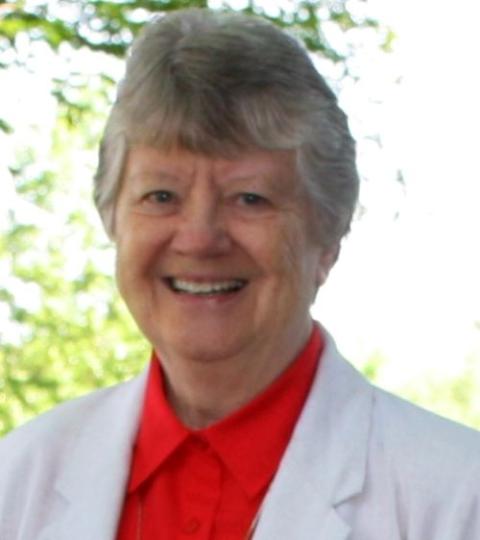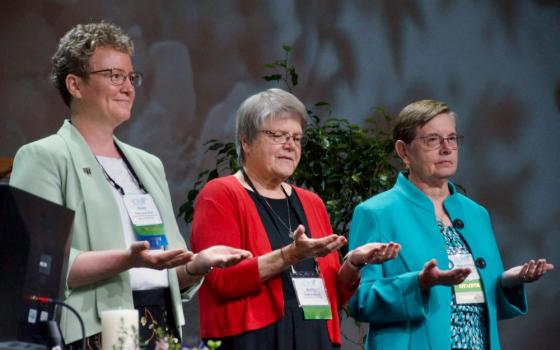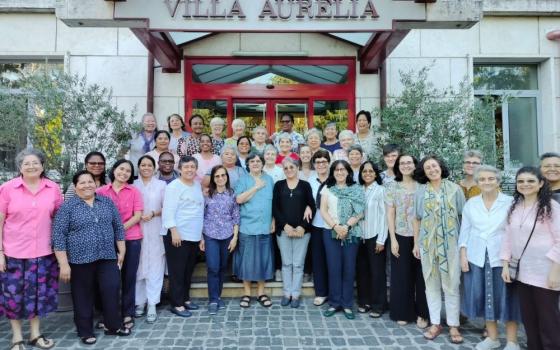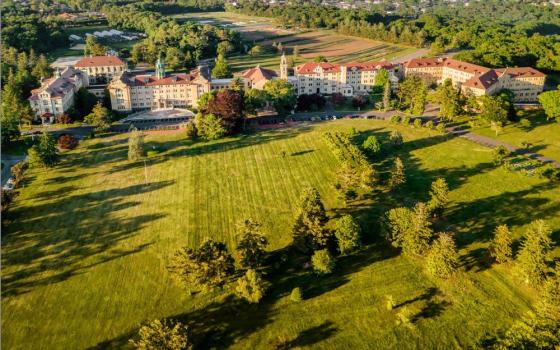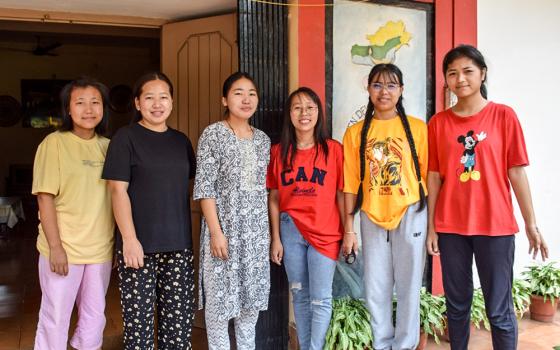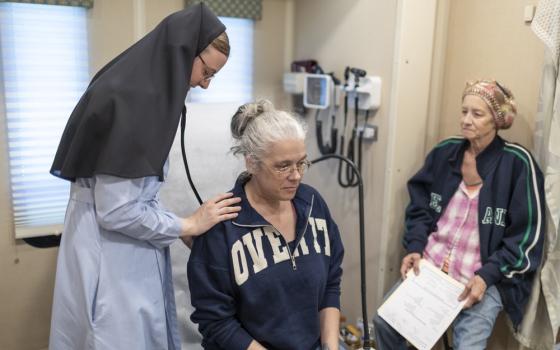Kathy Shannon, left, who uses her van to help transport donated furniture, poses with Sr. Francis Margaret Maag, center, and Geri Herbst outside Speers Court Apartments in Dayton, Kentucky, in October 2022. (Courtesy of Francis Margaret Maag)
When Sr. Francis Margaret Maag was searching for an apartment after she retired from a career in education in 2014, she deliberately chose one with no activities, no local church ministries, little maintenance and no feeling of community.
Speers Court Apartments for low-income seniors in Dayton, Kentucky, "was a place of gloom, I felt — a place of hopelessness and abandonment and neglect," said the member of the Congregation of Divine Providence, based in Newport, Kentucky, 2 miles away. "My ministry here was to change a culture of despair, loneliness, abandonment and neglect into a community of hopefulness and joy and a community of love and care."
Dayton is a city with a population of 5,600 across the Ohio River from Cincinnati. The U.S. Census Bureau reports that 20% of its residents live in poverty; the national poverty rate is 12%.
"It's a small town with little houses, one of the poorest areas in northern Kentucky," said Maag, 86.
But Speers Court, once a place no one wanted to be, now has a waiting list of prospective tenants and a feeling of community — so much so that one resident, after spending time in the hospital, complained that he couldn't wait to get home.
GSR: When you first moved in, there were no activities for residents, no feeling of home. What's it like now?
Maag: We have potluck dinners. We have gatherings of friends. We celebrate holidays and play bingo. People come together to play cards. We have First Friday Masses. We gather every week to pray the rosary and pray for peace and the needs of the community. We decorate the lobby for holidays and brought ladies to the ladies' tea gathering at the local church. There's a brass band from Cincinnati that does a concert a couple of times a year.
How did you pull this off?
All of this was done in a spirit of collaboration. It wasn't just me. Friends would donate to the potluck dinners, and residents would give a few dollars or bring a bag of chips. There is a group of residents that became my helpers. They set up before activities and clean up after.
People would move in here and have just a table and chair or maybe just a couch. But I met a man with a truck and said I need help moving furniture. There's also a lady with a van that helps — so much so that her husband has dubbed us "soul sisters with a mission from God." We have the help of a lawyer who, pro bono, resolved some of the issues we were dealing with. With all this collaboration, we've been able to change a culture. This is all the work of God.
How has this changed life for the residents?
I see people helping one another now. We're not perfect, but it's been a big change. I've seen their behavior change. Not everybody, of course, but I now see little groups get together and have their own activities. People who don't go to church see us praying the rosary and ask, "Say one for me."
By tending to individual needs, it changed their spirit and how they behaved. That negativity was let go.
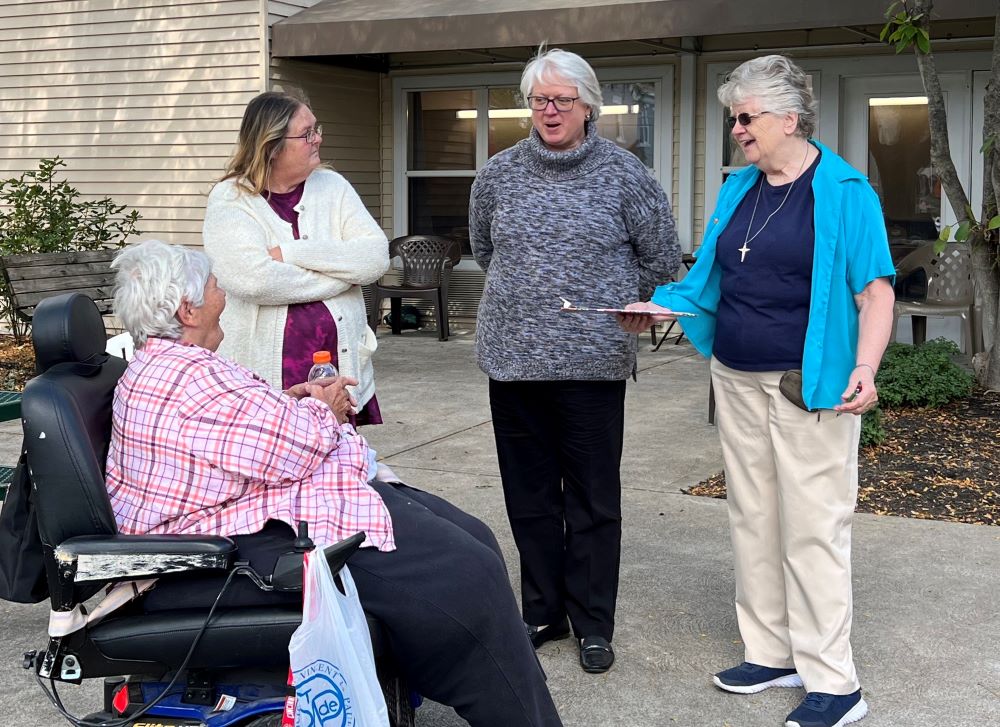
Speers Court Apartments resident Peggy Perkinson (left) and former resident Brenda Scott, both of whom help with activities for the complex residents stand outside the complex in Dayton, Kentucky, in October 2022. With them are Andrea Janovic, an attorney who helps residents with legal matters; and Sr. Francis Margaret Maag (far right). (Courtesy of Francis Margaret Maag)
What was it like when you first moved in?
At least three times a week, the police were here to settle disputes. There was a man who used to call this "the crazy house" or something.
There was no activities director. There was one lady in the office and one maintenance man. There was no outreach. There was nothing. It was dirty, dingy and smoke-filled.
It's one thing to plan activities, but how do you get the owners to do better maintenance and hire staff?
The lawyer who helps us, she considers this a mission. She told me about the law and what was required by the owners: They have to provide a safe, clean environment. So she helped me compose letters inviting change — not demanding it — and sent a copy both to the office and the owners. We never got a response, but we got change. There was a resident who said their pipes had been broken for two years, and they got fixed.
The administration really worked to spiff it up. The outside really looks clean. They redid the parking lots.
Advertisement
It sounds like you have a lot of help, as well.
Friends make clothing and find furniture. The members of my community help out with so much. An associate joined me in 2019 to form a prayer community, and with her help, I brought videos to show about caring for the environment. Friends serve cookies after events.
Two associates and two other sisters have joined me for a group we call the Emmaus Journey Community. They give me Christmas gifts to pass out to the residents and helped with the meal. It's all done with collaboration and the help of my community, the Emmaus Journey Community and the residents.
How do you see the Holy Spirit working through all this?
It's the spirituality of our charism: Providence. God does not abandon us.
People here felt abandoned. But we sisters have always been people who go to the neglected people.

